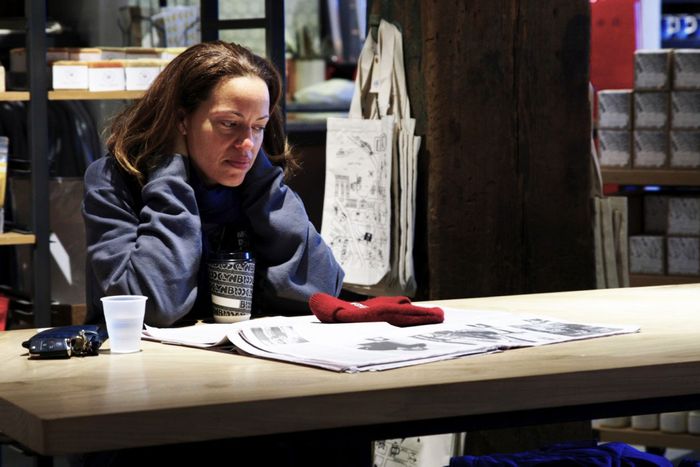
The directors of Happy Happy Joy Joy, a tribute to the ’90s animated cult favorite The Ren & Stimpy Show, were typing up the credits for what they thought was their completed documentary when they got a call about a story that would be breaking about the show’s creator, John Kricfalusi. Ron Cicero and Kimo Easterwood knew about Kricfalusi’s reputation as a difficult person — he’d famously been fired from his own hit series a little over a year into its run. But the article, published in March 2018 by BuzzFeed News reporter Ariane Lange, was about something else. It detailed allegations of sexual harassment and abuse from two women, Robyn Byrd and Katie Rice, who described being groomed by Kricfalusi when they were both underage admirers of his work.
“We realized right away we had a toxic movie,” Cicero said over the phone. “We panicked for a couple weeks.” Then they set to work tearing their initial film apart, conducting new interviews, and remaking it into the version that premiered at the Sundance Film Festival on January 28.
It’s been two years and three months since the first stories about former film producer Harvey Weinstein were published, starting an avalanche of allegations against powerful men that would forever change the industry — though maybe not as significantly as many of us had hoped. That’s enough time for Me Too to go from a topic of conversation in line and on panels to a significant onscreen influence at the annual indie-film showcase in Park City, Utah, Weinstein’s former stomping grounds. Reverberations from the movement can be seen all over the Sundance slate this year, in ways more and less direct than Happy Happy Joy Joy. Carey Mulligan trolled bars for bad men to call out in Emerald Fennell’s Promising Young Woman, while in Romola Garai’s Amulet, a convoluted horror story eventually revealed an unreckoned-with rape as its inciting incident. Sexual abuse lingered in the background of Eliza Hittman’s abortion drama Never Rarely Sometimes Always, and colored the atmosphere of the unnamed film company at which Kitty Green’s The Assistant is set.
Then there was On the Record, a documentary about the allegations of sexual assault and harassment against music mogul Russell Simmons that has itself become the center of a heated news cycle. The main focus, Drew Dixon, is a former A&R executive who worked at Def Jam, and whom the film follows as she struggles with whether to speak out about her experiences with Simmons, who’s denied all charges made against him. She ultimately joined Toni Sallie, a journalist at the time, and singer Tina Baker for this December 2017 story in the New York Times. The accusations made against Simmons in the film aren’t new and were vetted by the reporters, which made it all the more baffling when Oprah Winfrey, who’d boarded the film earlier as an executive producer, abruptly pulled her name and her Apple streaming deal from the project a week before the start of the festival. “I think there’s some inconsistencies in the stories,” she said on CBS This Morning, while insisting she believed the women in an attempt to stake out what, in this case, feels like an impossible middle ground.
If it weren’t for Winfrey’s actions eclipsing the film itself, it’s possible that the conversation around On the Record would focus instead on assessing how well two white directors — Kirby Dick and Amy Ziering — handled a film that delves into the pressures black women feel to protect black men with their silence, and the backlash they face when they speak out. “For 22 years, I took it for the team,” Dixon says at one point. “I didn’t want to let the culture down.” Dick and Ziering have made documentaries about sexual assault before, in the military in 2012’s The Invisible War and on campuses in 2015’s The Hunting Ground. But On the Record is also very much about race, and while the film assiduously relies on a chorus of interviewees — including Tarana Burke, Kimberlé Crenshaw, and Dr. Joan Morgan — to speak to these topics, it maintains throughout the cautious tenor of filmmakers venturing into territory they personally know nothing about.
That can make you long for directors who do, especially with regard to the colorism and connections to historical trauma that the film too hastily touches on toward the end. Winfrey’s withdrawal has ended up feeling like a messier, more vivid example of the pressures the film describes than what it puts onscreen. Sil Lai Abrams, another of On the Record’s survivors, told Deadline she thought Winfrey’s decision “had nothing to do with our veracity, and it had nothing to do with Russell being innocent,” pointing instead to the vitriol Winfrey received for her support of Michael Jackson doc Leaving Neverland, and the Simmons-abetted online furor that kicked up when On the Record was announced in December.
The ways in which charismatic leadership and the capability to silence can be used to cover up abuse were themes in other Me Too–adjacent films at the festival this year. The Assistant, starring Julia Garner as one of the many employees at a film company orbiting the black hole that is their Weinstein-esque boss, is a study of how abuse, both sexual and professional, gets normalized. Garner’s character, Jane, navigates erratic blasts of fury from the man while also contending, blank-faced, with evidence of the sex he leverages out of women looking to break into the field. Compliance is ground into her with every humiliation, with every affirmation that this is just what everyone has to weather. When she does take it upon herself to speak up, the head of HR (Matthew Macfadyen) dissuades her from filing a report by dangling her career aspirations like a carrot. “We could use more women producers. It’s a tough job, but I can see that you’ve got what it takes.”
Men like Weinstein (who’s currently on trial) and Simmons (who’s reportedly moved to Indonesia), men possessed of clout and industry respect, have been closely associated with Me Too. But movies at Sundance this year have also grappled with another kind of character, that of the self-described nice guy who’s not above gray-area assault or keeping quiet about bearing witness to rape. There are the two young men (Jon Orsini and Noah Robbins) who share an office area with the main character in The Assistant, who get an unkind laugh over listening in on their boss with, it’s suggested, a woman, and then solemnly tell Jane that she can always come to them if she needs to talk. There’s the parade of butter-wouldn’t-melt types — played by the likes of Adam Brody and Christopher Mintz-Plasse, among others — that end up in the crosshairs of the main characters in Promising Young Woman, outraged by having their own behavior called out even as they’re in the midst of it, and scandalized by the idea that there’d ever be consequences for it.
That these movies have little in common beyond their proximity to Me Too speaks to the fact that, two years and three months out, we haven’t come to any accord about what’s next, much less an agreement as to how to process all of the ugly truths that emerged and the anger that’s come with it. Movies like Promising Young Woman and Amulet hold fast to women’s rage, even when it’s self-destructive, declaring their intentions to never forget. The Assistant deals in the systemic, showing the ways in which its main character becomes complicit by choosing to participate in a business that seems to have abuse built into it. What happened with On the Record, which has been left to seek new distribution, suggests a tide rolling back, to the point where 20 women stepping forward with allegations about the same man are still not enough — not because of the truth, but because of the fury that comes from putting it on a big screen.
But it’s Happy Happy Joy Joy that was fundamentally reshaped by Me Too, and it’s Happy Happy Joy Joy that provides the most fascinating case study in how Me Too can change both the content and the conclusion of a movie. According to Ron Cicero and Kimo Easterwood, Ren & Stimpy creator John Kricfalusi only agreed to participate in the documentary after the allegations came out. On the one hand, the film ended up prominently featuring interview footage of the admitted abuser, who offers up a kind of rambling semi-apology at the end, but who doesn’t across as someone who’s done much self-examination. On the other, it also now includes Robyn Byrd, whose accounts of what happened are intercut with, and bluntly undercut, Kricfalusi’s. When he talks about reading her fan letters and marveling at how well a 16-year-old could write, she notes, “I had just turned 14 when I first heard back from him.”
Happy Happy Joy Joy may not be a great doc, but it’s one that you can practically see being reconsidered as you watch it, a new perspective on its own material being layered on top of what was already there. It may have started as a celebration of an animated series, but what it ended up as is an inquiry into genius, what it looks like, and what we’ve let people get away with in the name of it. And that does feel significant — a whole part of the story that had been left out previously is now insistently making itself heard.
More From This Series
- The First Cinematic Masterpiece of 2021 Is Here
- Promising Young Woman Is an Incendiary Revenge Movie With a Sugar-Sweet Shell
- The Forty-Year-Old Version Isn’t the Quirky Underdog Comedy It Might Sound Like



